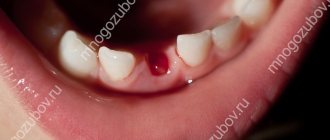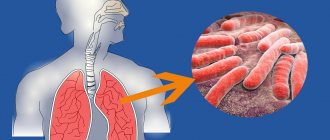How to stop bleeding after tooth extraction
Have a tooth been removed, but the bleeding does not stop for several hours?
How to act in this situation - on your own or still return to the doctor? Here are some simple tips on providing first aid after visiting the dentist. Bleeding after tooth extraction is normal. Even if it stopped and then started again, there is no need to panic. It may take 12 hours for a clot to form that will protect the socket from external infection. There are several ways to help you quickly get back to normal. You can use them at home using improvised means.
After tooth extraction, taste of medicine in mouth
A specific bitter or sour taste that appears in the mouth after tooth extraction is a sure sign of alveolitis, inflammation of the walls of the socket.
Important! The patient feels the first symptoms of alveolitis immediately after the anesthesia wears off. The main one is pain, which either subsides or returns for no apparent reason.
In the first days after a complex operation, the discharge of brackish fluid, ichor, from the wound is normal. If the liquid has a strong taste of pus, it means the hole is infected, and the inflammation has already gone quite far.
Photo 1. The situation after a complex tooth extraction - a hemostatic sponge was used and sutures were applied.
When will it disappear?
Sometimes patients are concerned about the taste of the medicine after tooth extraction and the specific smell that others also feel during a simple conversation. The fact is that the medicines used by dentists have an unpleasant bitter taste, so it is normal for it to remain in the mouth for 2 to 3 days after surgery.
Important! In small dental clinics offering services of questionable quality, the patient may experience an allergic reaction to cheap medications. In addition to the unpleasant taste in the mouth, itching and burning will be felt.
The more difficult the removal, the higher the risk of developing complications after it, and dentists consider extraction of a wisdom tooth (especially from the lower jaw) an operation of increased complexity due to the inaccessible location of the tooth and its curved root system.
We suggest you familiarize yourself with what relieves inflammation well
Often such procedures last more than an hour, and the tooth itself has to be removed in parts, after crushing it with special tools.
In addition, the process of removing a wisdom tooth is accompanied by heavy bleeding due to the extensive area of the lesion.
Bad breath after such an operation is a sure sign that complications could not be avoided and an infection has entered the hole.
Taste of medicine in the mouth: causes and methods of elimination.
The appearance of a medicine taste in the mouth is of a medicinal or non-medicinal nature and causes a person to worry about his health.
To get rid of unpleasant sensations, it is necessary to understand the causes, identify the etiology of a possible disease and improve the functioning of taste buds.
A specific bitter or sour taste that appears in the mouth after tooth extraction is a sure sign of alveolitis, inflammation of the walls of the socket.
Important! The patient feels the first symptoms of alveolitis immediately after the anesthesia wears off. The main one is pain, which either subsides or returns for no apparent reason.
In the first days after a complex operation, the discharge of brackish fluid, ichor, from the wound is normal. If the liquid has a strong taste of pus, it means the hole is infected, and the inflammation has already gone quite far.
Photo 1. The situation after a complex tooth extraction - a hemostatic sponge was used and sutures were applied.
When will it disappear?
Sometimes patients are concerned about the taste of the medicine after tooth extraction and the specific smell that others also feel during a simple conversation. The fact is that the medicines used by dentists have an unpleasant bitter taste, so it is normal for it to remain in the mouth for 2 to 3 days after surgery.
Top 5 practical tips
Method No. 1
Change the tampon that the doctor placed on the tooth. Take a sterile piece of bandage, fold it in several layers, cover the hole and press firmly, closing your jaws. To be on the safe side, you can moisten a new tampon with a 3% hydrogen peroxide solution. A clean bandage should be held with your teeth for 15-20 minutes; if you used peroxide, do not overdo it, hold for no more than 5 minutes.
Method number 2
Apply a hemostatic sponge; you can buy it at any pharmacy. The product has hemostatic properties, so it almost always helps. Cover a piece of sponge with a cotton swab and place it on the wound - after a few hours it will disappear without a trace.
Method number 3
Cold will help stop bleeding. Apply a piece of ice or a cold bottle of water to your cheek, after wrapping them in a napkin or towel. Leave for 4-5 minutes, then remove. Apply cold objects 3-4 times at intervals of 5 minutes.
Method number 4
Tea leaves have tanning properties, so you can try to stop the bleeding by placing a tea bag soaked in warm water in the tooth socket. You need to act very carefully so that the bag does not rupture and grains of tea leaves do not get into the wound.
Method number 5
Suitable for those who suffer from high blood pressure. Measure your blood pressure - if the readings are elevated, take “your” medicine that you always use.
What drugs increase bleeding?
- If bleeding is accompanied by severe pain, then there is a natural desire to get rid of it as quickly as possible. Drinking Aspirin and Ketanov is strictly prohibited, especially during pregnancy, as they thin the blood and increase blood flow. When the effect of the analgesics wears off, the situation may repeat itself, so if the pain is “not fatal”, it is better to be patient.
- It is not recommended to take a hot bath, drink hot or alcoholic drinks, that is, perform activities that can provoke a jump in blood pressure.
- For 48 hours you should not eat solid food or check the socket with your tongue. You can damage the formed clot, and the blood will flow with renewed vigor.
- If there is no inflammation, do not rinse your mouth. The liquid washes the “plug” out of the wound, so the process repeats.
What measures will help prevent bleeding after tooth extraction?
- Before visiting the dentist, take a tincture of motherwort or valerian. This way you will get rid of fear, calm the nervous system, and normalize blood pressure.
- Buy hemostatic drugs at the pharmacy in advance, for example, Dicynon. Such drugs accelerate thrombus formation, so a clot forms faster. Ask your pharmacy about contraindications.
- The day before your appointment, do not take blood thinners. Blood clotting disorders can lead to complications during surgery.
Myths about complications after tooth extraction
The bleeding should stop within half an hour
In practice, in most patients, the period of clot formation takes from 2 to 12 hours. This is due not only to the characteristics of blood clotting, but also to how accurately the doctor’s recommendations are followed.
Prolonged bleeding is a sign of alveolitis
If there are no signs of inflammation, then there is no reason to panic. Manifestations of alveolitis are strongly expressed, as a rule, by several signs simultaneously. This is a gray coating on the hole, bad breath, purulent discharge from the wound.
The doctor is to blame for severe bleeding
Do not rush to accuse the doctor of unprofessionalism. Complications may arise due to the patient’s nervousness or illnesses that he kept silent about before the appointment.
Risk factors
An unpleasant, repulsive odor from the mouth that forms after tooth extraction, which is also accompanied by a disgusting taste of pus, most often signals the beginning of an inflammatory process occurring in the gums.
This may be due to the introduction and development of infection in the hole. In most cases, this happens after wisdom tooth extraction. But there are other reasons that can cause an unforgettable amber from the oral cavity:
- Inappropriate implementation of the dentist's recommendations in the period after the operation . Usually the patient is advised not to consume hot liquids or food for a while, try not to injure the resulting wound with a brush, or touch it with the tongue or spoon. It is recommended to rinse your mouth with special disinfectants to promote faster healing. And if the patient does not follow these rules, then the risk of a putrefactive process and the appearance of a putrid odor from the hole increases.
- The formation of increased dryness in the socket. When a tooth is removed, after approximately three hours, the extraction site should
Dry socket causes many problemsa blood clot forms. It closes the wound and prevents harmful bacteria from getting inside. You cannot remove it yourself using a brush. However, there are situations when such a clot comes out on its own, and the hole becomes dry, which is a comfortable condition for the spread of infection. Most often, this situation is faced by those people who have impaired blood clotting and those who smoke a lot and often. Representatives of the fair sex who take hormonal drugs for contraception are also at risk. And if this is the factor in the appearance of a fetid odor, then the doctor will be able to carry out all the necessary measures that are preventive in nature and help to minimize this problem.
- Periodontal inflammation . A serious disease that often provokes complications and infections, which provokes the development of a putrefactive process. In this case, the patient who has had a tooth removed should be monitored by a dentist during the healing period.
- Remaining tooth fragment . When the removal was done poorly, and a piece of tooth remains in the gum, it will provoke the development of an inflammatory process. Swelling of the soft tissue will form in the wound area, pain will appear, which will only intensify in the future. Most often, this situation occurs after the removal of a wisdom tooth. Its position in the gum is horizontal and slightly inclined, which complicates medical intervention. It is not uncommon for such a tooth to not be fully erupted, so the risk that a splinter will remain in the gum increases several times.
Other reasons that contribute to the appearance of pus taste and unpleasant odor in the mouth:
- the presence of a chronic disease of the nasopharynx or mouth (sinusitis, sinusitis, rhinitis, adenoiditis) at the time of tooth extraction;
- if there are diseased areas with pulpitis or periodontitis nearby;
- if there was a granuloma or cyst on the root of the tooth, which the doctor had to scrape out;
- poor hygienic condition of the oral cavity at the time of the procedure (stones, heavy plaque).
How to stop bleeding after tooth extraction, in which cases to consult a doctor
After dental interventions, even if performed in accordance with all relevant rules and under ideal conditions, complications may develop. Bleeding often develops after tooth extraction.
Most often, this problem arises right in the dentist’s chair, where it is quickly and easily eliminated, however, especially in the presence of a number of diseases, so-called delayed bleeding may occur, which develops at home, where the ability to eliminate it is limited.
What to do in this case?
If after tooth extraction there is a persistent odor from your mouth and a taste of pus, you should immediately consult a doctor. The dentist rinses the hole with a manganese solution or hydrogen peroxide, while applying anesthesia. In special cases, when the inflammation has become advanced, a course of physiotherapeutic measures is prescribed.
Under normal conditions, a person is recommended to rinse his mouth with a warm manganese solution three times a day. In addition, the doctor may prescribe antibiotics and antiseptics, as well as drugs that relieve pain and discomfort.
If the patient follows all of the specialist’s recommendations, then after 10 days the unpleasant odor and accompanying symptoms will disappear.
A tooth has been removed, for what reasons can the wound bleed?
Excessive bloody discharge from the socket of an extracted tooth is possible for a number of reasons.
Among them are:
- Significant injury to surrounding soft tissues and small vessels. This situation develops especially often in the case of operations that are complex for one reason or another, during which incisions might be required. Naturally, such wounds take longer to bleed.
- Failure to follow doctor's recommendations. This is a fairly common reason. For example, this could be significant physical activity. Too frequent and intense rinsing of the mouth can also lead to a similar development of events, as well as too diligent palpating of the hole with the tongue - all this threatens the destruction of an already formed clot.
- A number of diseases require regular use of antiplatelet agents or anticoagulants. These drugs affect the blood coagulation system, so even the familiar aspirin can significantly increase the time it takes to release blood. Therefore, in consultation with the attending physician, such therapy may be discontinued before surgical interventions.
- Congenital disorders of the blood coagulation system, although they are relatively rare, can also be the cause of long-term and profuse bleeding from a seemingly trivial wound.
- Also, bleeding that does not stop for a long time is possible in cases where the tissues surrounding the extracted tooth were affected by an inflammatory process (especially of a bacterial nature). Substances released by bacteria, as well as the body during an inflammatory response, slow down blood clotting processes, which can serve as a fairly significant reason.
Possible complications
If you do not react to the problem in time and do not begin to eliminate it, then the infected hole can cause the following complications:
- Inflammation of the periosteum . It manifests itself as painful gums and significant swelling. Discomfort may increase when a person eats solid food or uses a toothbrush. Then the inflammatory process begins to spread, causing swelling of the neck, chin, lips and cheeks. Body temperature rises, headache occurs, and a white coating forms on the inside of the mouth. Subsequently, a lot of pus appears in the wound area, which comes out through the hole. In this case, washing and disinfection of the wound, taking antibiotics and analgesics are prescribed.
- Alveolitis . This disease develops unnoticed by the person himself. But it is developing quite quickly. It manifests itself as pain. The pain is aching at first, and then becomes shooting and constant. The pain covers the entire jaw, moving to the temple and neck. If such a disease develops against the background of wisdom tooth removal, then discomfort is felt in the ear area, a rotten smell from the mouth is felt, and an inflammatory process develops. Over time, difficulties arise with normal mouth opening. Swelling of the cheeks and gums appears, the mucous membrane becomes very red. Treatment of the disease is also based on taking medications that relieve inflammation and eliminate pain with swelling.
- Abscess . During tooth extraction (especially wisdom), trauma to the tissues of the oral cavity is possible. And then purulent processes begin to develop in the wound area, provoking the appearance of an abscess. Most often, this happens in cases where a person after the procedure does not follow the dentist’s recommendations regarding proper oral care.
How to stop bleeding after tooth extraction
You can try to cope with not very active bleeding on your own.
To do this, you can use the following methods.
The simplest option is cold applied to the damaged area.
Among other things, this remedy also has a pronounced analgesic effect. Ice, snow, frozen food from the refrigerator - anything will do. It is enough to apply cold to the cheek in the projection of the extracted tooth and hold it for a while.
Tamponade of the socket
You will need a sterile bandage, from which you should form a tight tampon. The resulting tampon must be placed over the socket of the extracted tooth and bitten firmly (it should fit tightly to the wound surface). In the absence of pathology of the blood coagulation system, bleeding should stop fairly quickly.
Hemostatic sponge
It is sold in any pharmacy, and differs from a regular gauze swab in that it is impregnated with special preparations that stimulate local thrombus formation and activate the blood coagulation system.
You should also measure your blood pressure if possible.
If the numbers are not within the normal range, it is quite possible that the cause of ongoing bleeding is high blood pressure. In such cases, antihypertensive drugs will help (if such drugs were previously prescribed by a doctor and they are available, you can try to lower the blood pressure yourself).
How long can a hole in the gum bleed?
After tooth extraction, slight bleeding is quite normal, since during this operation, more or less pronounced damage to soft tissues and small vessels usually occurs.
Immediately after extraction of a tooth affected by a pathological process, the hole in which it was located is filled with blood, and the bleeding stops on its own within a minute or a little longer.
However, even after it stops for a certain time, discharge from the wound of an ichorous nature is possible, which can turn the saliva red - often this situation is very frightening for patients.
If the blood does not stop on its own, then most likely there is some pathology of the coagulation system or another reason (such as taking anticoagulants or antiplatelet agents).
Is it possible to swallow blood after tooth extraction?
There are several basic situations in which blood ingestion is most likely to occur. These are various types of surgical interventions in the oral cavity and nosebleeds.
In any case, swallowing blood should be avoided, since in most people swallowing a certain amount of blood causes vomiting, which can lead to an increase in blood pressure (which is already high when such bleeding occurs).
And this can potentially threaten complications in the form of strokes and heart attacks. Therefore, in case of nosebleeds, and after tooth extraction, or other surgical interventions, the blood must be spat out.
All about why bad breath occurs after wisdom tooth removal
Despite the speed of implementation and modern techniques, removal of a dental unit is a surgical procedure that leads to injury to the mucous membrane. As infection enters the wound, various pathological conditions begin to develop. In most cases, extraction, especially of wisdom teeth, is accompanied by the appearance of an unpleasant odor from the oral cavity. Every person should have an idea of what this symptom may indicate and how dangerous it can be for overall health.
Consequences after extraction appear due to the location of wisdom teeth and their massive roots. Due to inflammatory complications, an unpleasant taste appears in the mouth.
Other causes of the problem include the formation of a cyst at the site of the torn element. Due to a benign tumor, the body tries to separate healthy soft tissues from infected ones. Inside the cyst there is a serous fluid that gives off a bad odor. If not treated in a timely manner, a benign neoplasm transforms into a gumboil or breaks out.
People with diabetes often experience hematomas after wisdom tooth extraction. To eliminate the tumor, the doctor makes an incision in the soft tissues of the gums and installs a drainage in the surgical field.
Bad breath after tooth extraction is the first sign of developing disorders. Only a dentist can identify the exact cause of the problem and find a way to eliminate it.
What to do if secondary bleeding occurs
Secondary bleeding is a pathological phenomenon delayed in time from the surgical intervention, and in the vast majority of cases it occurs outside the dental office.
One of the most common reasons for this development of events is the end of the pharmacological action of the combination of local anesthetic + adrenaline drugs.
The popularity of this combination is due to the vasoconstrictor effect of adrenaline, which provides longer-lasting pain relief with the same dose. After the end of the effect of this combination of drugs, the vessels, on the contrary, dilate, which quite naturally leads to an unpleasant situation.
In this case, it is worth using socket tamponade or using a hemostatic sponge. If such measures do not have any effect, you should seek medical help.
In those cases where the pathological phenomenon is caused by hereditary diseases in which the blood clotting processes are disrupted, treatment is required.
Usually this is either a transfusion of the necessary clotting factor, or blood plasma from a healthy donor, which contains them all.
Secondary bleeding caused by increased blood pressure begins to be treated with antihypertensive drugs (which are used immediately after tamponade of the problematic tooth). In most cases, after blood pressure returns to normal, the blood stops on its own, without any additional action.
With the use of antiplatelet agents and anticoagulants, everything is somewhat more complicated. Usually they are canceled some time before the intervention, however, if pathological phenomena arose precisely because of these drugs, then antidote therapy may be necessary (which, however, does not exist for all drugs - in such cases, treatment is symptomatic)
When should you contact a dentist?
Actually, by and large, you should seek medical help in two cases - when the bleeding has not stopped for a long time by any means, or in cases of additional symptoms such as weakness, dizziness, rise in body temperature, acute, throbbing pain.
Usually, in cases where there is no need for any additional treatment, the wound is either tightly tamponed (the tampons are not removed until granulations appear in the wound, since otherwise the release of blood is likely to resume.
If the patient has undergone a complex or extensive operation, or has hypertension, or some other factor that contributes to prolonged bleeding, then a decision may be made in favor of suturing.
They bring the edges of the wound closer together, stop the bleeding by squeezing small blood vessels and thus accelerate the healing process.
In the vast majority of cases, after tooth extraction, no additional measures other than those already taken by the dentist during the procedure are required.
However, although relatively infrequently, with prolonged bleeding from the socket of an extracted tooth, qualified medical assistance may be required.
For more information about bleeding after tooth extraction, see the video:
Folk remedies to stop bleeding after tooth extraction
There are not so many traditional medicine recipes that would describe ways to stop the ongoing bleeding from the socket after tooth extraction.
Most of them come down to tamponade, but with certain features:
- In the absence of a bandage, folk recipes recommend using an ordinary tea bag for tamponade. Tannins contained in large quantities in black tea lead to vasoconstriction, which can speed up the cessation of bleeding.
- A tampon soaked in a decoction of oak bark has a similar effect to black tea. The tannins contained in the plant bark trigger the coagulation processes of surface protein compounds and have a vasoconstrictor effect. Thanks to this, rapid formation of a blood clot can be achieved.
- Cotton swabs soaked in various plant juices are often used. It could be aloe, calendula, chamomile.
- But you shouldn’t rinse your mouth with decoctions of the same herbs. This can lead to the destruction of the blood clot, which threatens the resumption of a pathological phenomenon that has almost ceased.
Causes of bad breath after tooth extraction
Any person will feel uneasy when an unpleasant odor forms in the mouth after tooth extraction. As usual, this indicates mistakes made during the operation or during the healing period. There are reasons that arise regardless of the doctor or patient - for example, weakening of the body in the postoperative period due to acute respiratory viral infections can also give impetus to the development of infection, as a result - bad breathing.
Surgical intervention
Other
Important! A rotten smell after tooth loss means the onset of inflammation.
If at any stage of recovery there is a failure and the wound cannot heal, there is a risk of infection and the appearance of odor from the hole after tooth extraction. Normally, a clot forms immediately after extraction, filling all the empty space in the gum. After 2-3 days, granulation tissue forms at the bottom - the clot may turn a little yellow - this is normal. After a week, the edges of the gums will begin to heal the damaged area, but very slowly. On average, the healing process takes 1.5 months.
Failure to follow the dentist's recommendations
An operation is a surgical intervention after which the patient must help his body return to normal. The doctor gives certain recommendations. Their violation can lead to bad breath after tooth extraction:
- do not eat anything for 2 hours;
- Do not rinse your mouth for the first 24 hours;
- follow a gentle diet - do not eat rough, hot or cold food;
- stop smoking and do not consume alcohol during the postoperative period;
- Do not touch the operated area with your hands or tongue.
All these measures are aimed at preserving the clot in the hole; if they are not followed, it will be washed away, opening the way for infections.
Dry gum skin
The loss of a clot from the hole is fraught with its drying out. It may disappear or resolve prematurely on its own, this is facilitated by:
- bad habits – smoking, drinking alcohol;
- taking hormonal medications;
- problems with blood clotting.
If there is no longer a clot in the hole, you need to visit the dentist as soon as possible so that he can prescribe medications that prevent pathogenic bacteria from entering the wound. Otherwise, you can get a complication - alveolitis.
Remaining tooth in the gum
The unremoved part of the bone tissue can provoke inflammation, due to which, after tooth extraction, the breath stinks of rotten meat. Accompanied by swelling of the gums, increasing pain, and body temperature may rise. Often this phenomenon is observed after the extraction of a figure eight - a wisdom tooth that grows horizontally or is completely/partially impacted (not erupted). It's difficult to get close to him.
If the gums are swollen or in pain, you should urgently consult a dentist - an X-ray image can detect residual effects and remove them.
Why may blood come from the mouth after tooth extraction?
Dental treatment, and even more so, their removal, is in any case a traumatic procedure. Even if the process itself is completely painless thanks to local anesthesia, after the injection wears off, you need to be prepared for not the most pleasant consequences. After all, a mechanical effect was exerted on soft and bone tissue, more or less strong.
The doctor always warns you what to expect when you return home, especially if a difficult tooth has been removed. Each patient is informed that slight bleeding of the wound or gum is possible - this is completely normal, as is swelling or pain. Within 24 hours, all these unpleasant symptoms should subside, and after a few days they should completely disappear.
But what does it mean if light bleeding does not stop, but intensifies? Why does scarlet blood come from the mouth, and the resulting clot constantly breaks off and falls out? Do I need to see a doctor, how dangerous is it and what can be done at home to stop the bleeding?
Prevention
To prevent halitosis and other unpleasant symptoms from occurring a few days after tooth removal, you need to adhere to a number of rules:
- Apply a cotton swab to the wound if there is excessive bleeding.
- Avoid rinsing your mouth in the first days after the intervention.
- Take a pain reliever if the discomfort is unbearable.
- Do not smoke or drink alcohol for 3-4 days. Bad habits contribute to the destruction of the blood clot.
- After 2 days, treat your mouth with antiseptic compounds recommended by your dentist.
- Relieve swelling of the cheeks and gums with cold compresses.
We invite you to find out which doctor treats the oral mucosa
Halitosis after tooth extraction is the first sign of a developing infectious lesion of the soft tissues of the mouth. If it is not possible to go to the clinic, then emergency measures must be taken at home, which include antiseptic treatment and compliance with postoperative rules.
The main preventative measure for pain and bad breath after tooth extraction is to follow all the dentist’s recommendations. In addition, the following techniques will help to avoid the inflammatory process:
- To stop the bleeding, which usually happens on the first day of removal, you need to apply a cotton swab to the wound. Read more information about how to stop bleeding after tooth extraction in this article;
- on the same day, refuse any rinsing;
- do not eat spicy food and take only warm food;
- if the pain is severe, you can take a painkiller and apply an ice pack to your cheek;
- Do not smoke or drink alcohol under any circumstances;
- Use the rinse prescribed by your doctor for a week;
- You can brush your teeth on the second day after removal, but try not to touch the still fresh wound.
By following the rules for using medications and not exceeding their dosage, you can avoid unpleasant consequences in the form of the taste of the medicine. Before taking antibiotics, you should discuss the possibility of side effects with your doctor. A specialist will definitely advise on methods to prevent them.
Maintaining oral hygiene is the most effective means of preventing pill taste. During the period of replacing fillings, removing teeth or tartar, it is recommended to use a toothbrush with soft bristles twice a day, rinse your mouth after eating, using herbal decoctions or special rinsing solutions sold in stores and pharmacies. Using dental floss will help remove food debris from the interdental space.
Taste of iodine from medicine after tooth extraction.
I am concerned about the taste of iodine after the removal of a “wise” tooth. The operation was difficult. The doctor said that this is a medicine, it will dissolve on its own. See him in 4 days (to remove stitches). It’s impossible to eat, I just put something in my mouth and immediately get this taste, but I want to eat.
Please tell me, is it normal for this medicine to leak out? How long will it take for it to resolve?
And yet, I am on my third day since the operation, and by the third day the swelling has increased to the maximum: this is both the neck and the cheek. Please tell me when to sound the alarm?
The peak of swelling is exactly 3-4 days, that is, this is the norm. As for the taste of iodine, there is no escape from it. This is also the norm, and you will have to come to terms with it for a while.
For those who have had their wisdom teeth removed, the taste of medicine remains in your mouth for a long time.
Good evening, girls! Has anyone had their wisdom tooth removed? Did the taste of medicine remain in your mouth for a long time? I’ve had this unpleasant taste for 2 days now (Did you put something self-dissolving in the wound? And did you go and check the wound afterwards?
deleted. there was no aftertaste. didn't put anything in. I didn’t check the wound, I just rinsed it with baking soda and salt.
Yes, there was an aftertaste for a couple of days, then it went away. They put a hemostatic sponge in, but they couldn’t do much. The injection was given
medicines are injected when there is a lot of pus, then there is a taste, but usually there is none
Yes. It was 2-3 days. Even longer
This summer I removed it, for more than a week there was definitely a taste
I was like this for 4 days, it was definitely then everything went away
For a long time there was a nasty taste ((I remember and shudder!
the taste was just from this, either a hemostatic or an absorbable medicine. but the blood flowed from morning to evening. and everything hurt for 4 days. but they cut the hood around my other wisdom tooth. The pain was such that ketarol did not suppress it both before and after. but then it all went away))
That year I had my wisdom teeth removed. They prescribed the table. and spray Miramistin into the hole. I don’t remember the taste, but the hole healed in about a week.
What should normally happen after tooth extraction?
Even with a simple removal of a single-rooted tooth, the hole will still bleed.
To quickly stop the bleeding, the doctor places a cotton swab in the wound and asks the patient to bite it firmly. Depending on blood clotting, after 5-20 minutes a clot should form at the bottom of the hole. After this, the tampon can be removed. But to be on the safe side, some advise not to remove it for 40-50 minutes – that is, until the patient gets home. If a clot has formed - no matter what size, sometimes it can protrude beyond the gums and be felt by the cheek or tongue - then everything is going well. At this stage of wound healing, there is no need to rinse it, much less try to tear off a clot or pick it out with a toothpick.
On the contrary, it must be protected and not disturbed even with one’s tongue. Why is the clot so important? Because this is the key to quick and painless healing of the wound. It serves as a barrier between open bone and microorganisms that are always present in the oral cavity. Its main function is to prevent bacteria from entering the wound. After a few days, the clot will lighten, change color and eventually merge with the mucous membrane. This means that the hole has completely closed. A little more time will pass, and it will be possible to begin prosthetic replacement of the extracted tooth.
But it also happens that a clot formed immediately after removal of the operation, the doctor sent the patient home safely. A few hours later the clot came off and the blood began to flow again. Sometimes bleeding begins a few days after the operation, when, it would seem, everything should have been delayed a long time ago. Why is there bleeding from the wound? What could be the reasons? How to recognize this is normal, or is it time to see a doctor?
Why is there bleeding - the main reasons
Unfortunately, most often bleeding after tooth extraction begins for two reasons:
- negligence of the doctor - if soft tissues are severely injured when extracting the root, a large blood vessel is touched, etc.;
- Patient negligence – if recommendations were not followed or were carried out incorrectly.
Previously, dentists always prescribed rinses after extraction, but now many people refuse them. Why? Very often, it is too intense rinsing that causes the clot in the hole to come off - and, as a result, bleeding. Therefore, if the doctor said that there is no need to rinse your mouth, then you really shouldn’t do it.
Prevention of bad breath after tooth extraction
The main task of the body after surgery is to form a protective clot and preserve it. Under no circumstances should the patient aggressively clean the socket, and should not rinse the mouth for the first two days.
Tooth extraction is a rather painful and unpleasant procedure, which is prescribed only when conservative treatment does not have the desired effect.
However, after extraction of a tooth from the alveolus, complications and negative consequences are common, one of which is infection of the tooth socket and, as a consequence, the appearance of a repulsive odor emanating from the oral cavity.
What else can cause bleeding?
- Physical activity: It is worth repeating once again that tooth extraction is also a surgical intervention. In the next 24 hours after surgery, it is not advisable to drive a car or perform responsible work (including mental work). It's better to rest, sleep for a few hours. Stress and emotional experiences, even positive ones, are also best avoided. You should temporarily give up any sports activities, even morning exercises.
- Solid and hot food. Even if there is no pain and there is no bleeding, you should not put too much stress on your jaw immediately after surgery. The wound should heal. In the meantime, it is better to consume soups, cereals, purees, pates, and slightly warmed up - not straight from the stove.
- Alcohol and smoking. The doctor warns that alcohol should be completely avoided for several days. Firstly, it dilates blood vessels and provokes bleeding, and secondly, it can give unwanted side effects, including severe intoxication in combination with antibiotics (they are almost always prescribed after tooth extraction).
- Overheating. Hot baths, saunas, prolonged exposure to the sun or in a well-heated room are also contraindicated until the wound has healed. Why? Heat causes blood vessels to dilate and flow to the head, which means bleeding.
- Menstruation in women. During this period, the composition of the patient’s blood can change greatly, its coagulability decreases significantly - this is necessary for natural monthly cleansing of the body to occur. But when treating teeth, this phenomenon is extremely undesirable. Even a small injury or wound can take a very long time to bleed or take a long time to heal. And tooth extraction often turns into a real disaster - which is why experienced dentists refuse to perform it these days.
- Taking medications that thin the blood. These can be either serious drugs used in the treatment of atherosclerosis or diabetes mellitus, or regular aspirin taken for headaches.
Some chronic diseases are also causes of poor blood clotting. With iron deficiency anemia, bleeding caused by tooth extraction is often observed. At the same time, the patient himself may not know that he has a lack of hemoglobin in his blood. Therefore, if the above reasons do not suit you, you carefully followed all the doctor’s instructions, but bleeding still started, it makes sense to take a detailed blood test.
What to do before seeing a doctor
In addition to a putrid odor, infection is accompanied by the following symptoms:
- severe pain of increasing intensity that is not relieved by anesthetics;
- heavy bleeding 5 – 6 hours after surgery;
- increase in body temperature up to 38°C;
- general malaise.
Important! Even in the absence of alarming symptoms, a visit to the doctor 3 to 4 days after tooth extraction is mandatory.
- severe pain of increasing intensity that is not relieved by anesthetics;
- heavy bleeding 5 - 6 hours after surgery;
- increase in body temperature up to 38°C;
- general malaise.
Important! Even in the absence of alarming symptoms, a visit to the doctor 3-4 days after tooth extraction is mandatory.
Tooth extraction is considered a minor operation and complications may develop after it. They are most often observed in patients suffering from pathologies of the cardiovascular system.
If disturbing symptoms appear after the intervention, you should see a doctor. Even if no alarming signs are observed, you must visit the dentist 3-4 days after the intervention so that he can assess the condition of the socket and, if necessary, take a control X-ray of the jaw.
Signs for an urgent visit to the dental clinic:
- persistent discomfort, even after taking painkillers;
- increasing the intensity of pain in the problem area;
- the occurrence of allergic reactions to antibiotics prescribed after tooth extraction;
- the appearance of temperature;
- heavy bleeding 4 hours after extraction.
The sooner the necessary measures are taken, the sooner the soft gum tissue will heal. And in this case, a person has the opportunity to quickly install a prosthesis to fill the missing element of the series.
Unfortunately, there are situations when it is not possible to get an appointment with a dentist quickly. In this case, you can help yourself by following these recommendations:
- be sure to clean your tongue of plaque using a special scraper;
- When hygienic brushing your teeth, pay more attention to working on all areas, including cleaning the interdental spaces with floss;
- After each meal, be sure to rinse your mouth with warm purified water with the addition of a few drops of mint or lemon essential oil;
- To relieve inflammation, you need to use special rinses that do not contain alcohol. It’s good if they contain mint or eucalyptus extracts;
- You can also rinse your mouth with self-prepared decoctions of oak bark, St. John's wort, lemon balm, chamomile, eucalyptus, sage, mint;
- eat right - eat more nuts, vegetables and fruits, and exclude meat, fish, confectionery, semi-finished products, ready-made fast foods, dairy and fermented milk products.
As for more radical measures, treating the hole where the tooth was with hydrogen peroxide or a solution of potassium permanganate will help relieve inflammation - the hole is carefully soaked with cotton wool and the solution. Lidocaine or Novocaine lotions and cooling compresses will relieve inflammation and pain.
Especially such preventive techniques can protect against further adverse consequences after wisdom tooth removal. There is no need to endure pain and take analgesics - such techniques do not cure. And the purulent process can manifest itself with might and main.
When providing yourself with emergency help, you should remember that some home remedies may not be so harmless. This is especially true for soda and saline solutions, which dentists do not approve of rinsing with.
Following the above rules of first aid will help to get rid of bad breath to some extent. However, you will still have to visit the dental office. Only there can they prescribe the correct therapy that will help completely cope with the inflammatory process.
When there is cause for concern
So, even if a clot does not form in the first half hour after surgery, it is considered normal if the hole bleeds for another 12 hours. But it does bleed - when spitting, the saliva should be slightly pink, but not bright red. After this time, the bleeding should stop, and a clot should form at the bottom of the hole.
The clot can be very small and located at the bottom of the hole. Or be bigger. Sometimes it creeps onto neighboring teeth. It's okay, this is also the norm. no need to try to tear it off - this way you can almost certainly provoke bleeding by opening the wound.
You should worry if:
- 12 hours have passed, and the wound is still bleeding and there is no clot;
- less than 12 hours have passed, but a clot does not form, and the bleeding becomes very intense;
- The clot is very large and breaks off all the time, and new ones form in its place.
If you feel pain, sharp, aching or throbbing, if your body temperature rises, chills, dizziness, nausea appear, you should immediately call a doctor.
If, apart from bleeding from the hole, nothing else worries you, it is still worth returning to the office where the operation was performed so that the doctor examines you and assesses the situation. You can stay at home if the office is already closed and visit the dentist the next morning - he will tell you what the reason is and stop the bleeding. But for now you need to help yourself somehow to stop the bleeding at least a little and fall asleep.











